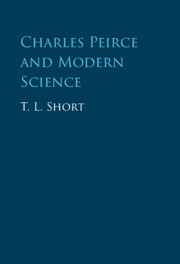
-
Select format
-
- Publisher:
- Cambridge University Press
- Publication date:
- October 2022
- September 2022
- ISBN:
- 9781009223508
- 9781009223546
- 9781009223522
- Dimensions:
- (229 x 152 mm)
- Weight & Pages:
- 0.57kg, 292 Pages
- Dimensions:
- (229 x 152 mm)
- Weight & Pages:
- 0.426kg, 292 Pages
You may already have access via personal or institutional login
Book description
In this book, T. L. Short places the notorious difficulties of Peirce's important writings in a more productive light, arguing that he wrote philosophy as a scientist, by framing conjectures intended to be refined or superseded in the inquiries they initiate. He argues also that Peirce held that the methods and metaphysics of modern science are amended as inquiry progresses, making metaphysics a branch of empirical knowledge. Additionally, Short shows that Peirce's scientific work expanded empiricism on empirical grounds, grounding his phenomenology and subverting the fact/value dichotomy, and that he understood statistical explanations in nineteenth-century science as reintroducing the idea of final causation, now made empirical. Those innovations underlie Peirce's late ideas of a normative science and of philosophy as a branch of science. Short's rich and original study shows us how to read Peirce's writings and why they are worth reading.
Reviews
‘T. L. Short's book is an enormously important contribution to Peirce scholarship that masterfully weaves together many different strands from Peirce's writings to present a rich, detailed, and tightly argued account of his view of science, his work as a scientist, and how that view and that work informed, motivated, and nourished his philosophy. Even the most knowledgeable Peirce scholars will come away from Short's book with a deeper understanding of familiar ideas and doctrines–like Peirce's pragmatism, realism, phenomenology, view of the normative sciences, etc.–and how they relate to each other and to Peirce's life as a working scientist.'
Robert Lane - University of West Georgia
‘This is an impressive book not only about Peirce’s philosophy but also about how to read and interpret it.’
Mousa Mohammadian Source: Metascience
Contents
Metrics
Altmetric attention score
Full text views
Full text views help Loading metrics...
Loading metrics...
* Views captured on Cambridge Core between #date#. This data will be updated every 24 hours.
Usage data cannot currently be displayed.
Accessibility standard: Unknown
Why this information is here
This section outlines the accessibility features of this content - including support for screen readers, full keyboard navigation and high-contrast display options. This may not be relevant for you.
Accessibility Information
Accessibility compliance for the PDF of this book is currently unknown and may be updated in the future.


